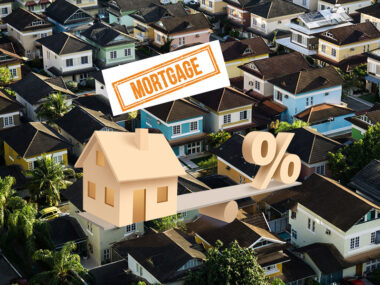There’s no doubt that housing has always represented a significant living expense for the average person. Even as a larger expense, though, there are general guidelines that have been established over time to keep housing costs from eating up too much of a person’s budget.
The old rule of thumb is that your total housing costs should never exceed 30% of your income. This includes mortgage and rent payments, property taxes, insurance payments, and utilities. Altogether, the costs associated with living in your house or apartment shouldn’t surpass three-tenths of your income.
In recent years, however, that principle has become increasingly more difficult to stick to as the cost of housing has gone through the roof. A 2017 report from the Joint Center for Housing Studies found that one out of every three U.S. households spends over 30% of their income on their housing arrangements. This puts tens of millions of renters and homeowners under financial pressure.
The question is, why have housing costs become increasingly unmanageable in recent years? The answer concerns two critical factors of the U.S. economy: housing supply and wage stagnation.
Table of Contents
Wage Stagnation in the US
While it’s easy to point to the exorbitant cost of a house as the reason it can’t be purchased, that isn’t the only reason Americans are struggling to pay their mortgages.
Another primary — albeit less obvious — factor that is spurring the housing cost crisis is a general stagnation of the wages. While the housing market has shown continual, robust growth for years, most U.S. workers’ wages haven’t budged in decades.
The numbers may look good on the surface, but the purchasing power of a modern worker’s wages is nearly the same as it was back in the early 1970s. In other words, although the take-home pay has increased considerably, it hasn’t actually kept up with the overall rising costs of living — and that includes housing costs.
Will Wages Increase?
The natural follow-up question is if wages will increase in the near future. While an absolute answer to this question can be little more than conjecture, experts believe at this point that wages will only increase marginally.
In response to the lag in the purchasing power of wages, many states have been actively adjusting their minimum wage laws to help address the issue.
While this may sound good, it cannot necessarily be taken at face value. A wage increase might help workers meet the cost of living, but it won’t allow them to stockpile the extra cash you need to buy a house.
In addition, while minimum wages will likely continue to increase, the effect of these increases can largely vary. For instance, a two or three dollar bump in your hourly pay may make a significantly larger difference for someone living in a rural area, where the rent is cheap, compared to someone who is living in an urban area like Brooklyn, where the cost of living is nearly double the national average.
Are House Prices Going Up?
While wages may have remained stagnant for the last half-century, housing prices have done the opposite. The value of homes in the U.S. continues to soar, largely fueled by high demand and low supply. According to one report, there were over 12,000 fewer homes for sale in June of 2019 than there were a year previously.
When contrasting wages to housing, it’s helpful to consider that the average home was 4.2 times the median household income in 2017. This was up from 3.3 times the median income in 2011 and 3.2 times the median income in 1988.
Research has also found that throughout the United States, home value has appreciated at a robust 6.7% per year, while rent prices have increased at a lower, yet still impressive rate of 3.5% per year. This has led an increasing amount of individuals, especially millennials and younger adults, to opt for renting over homeownership.
For some, renting has helped to contain the financial strain caused by the gap between their wages and their housing costs, while for others, it’s literally the only option they have available, as purchasing a house is simply too expensive.
Will House Prices Keep Rising?
With a firm picture of languishing wages and ballooning housing prices in the rearview mirror, one question worth asking is if the trend will continue in the near future.
Unfortunately, many experts are predicting the answer is yes. In spite of the fact that an over-inflated housing market was one of the key precipitators of the Great Recession in 2008, the current housing market is stubbornly continuing to be problematic.
However, more and more analysts are predicting that the increase of housing prices in 2020 will begin to taper off a bit. Of course, the same caveat applies here as it did with forecasting wage increases. Any predictions regarding the future of the housing market must be taken as educated guesses and nothing more.
Regardless of the specific economic conditions that the future holds, as it currently stands there’s no doubt that the issues of stagnant wages and rising housing costs have created a massive collective headache for millions of Americans.
For many, the issue is already so severe that it’s reached an unsustainable point, which must be remedied before long. Whether it comes in the form of higher wages, lower housing costs, or a combination of both, if a solution doesn’t arise soon, it could create even greater struggles for countless workers in the not-too-distant future.
Image Source: https://depositphotos.com/





